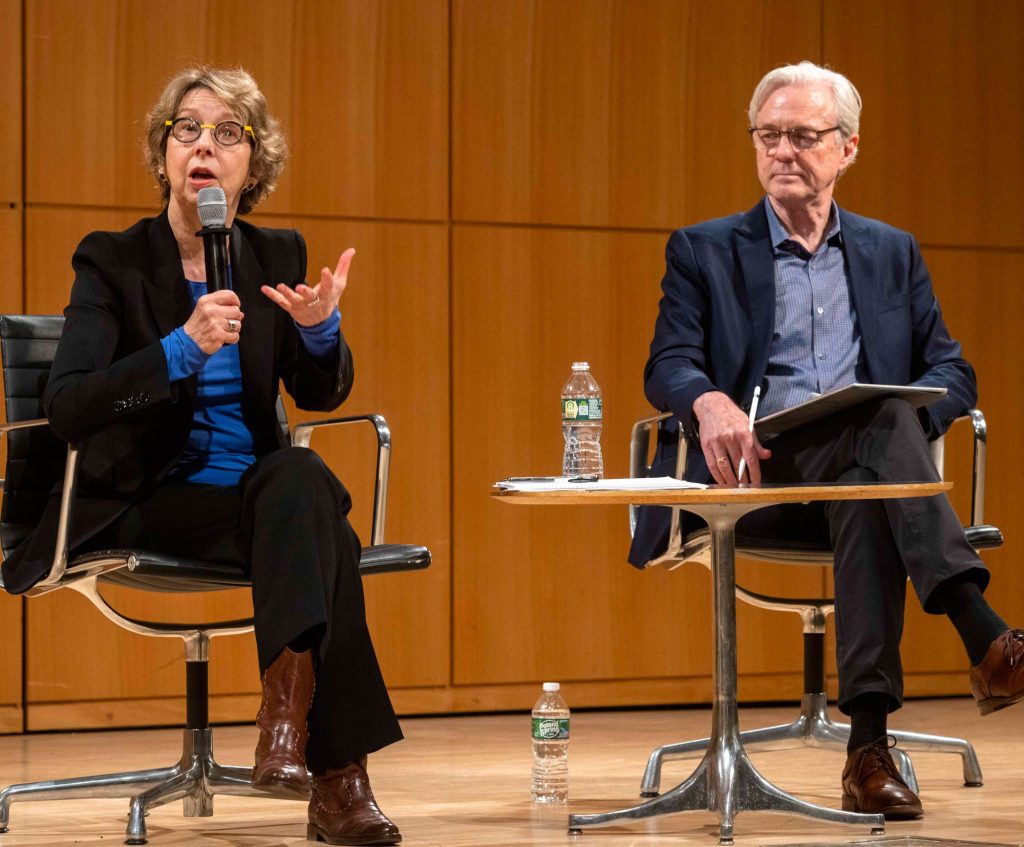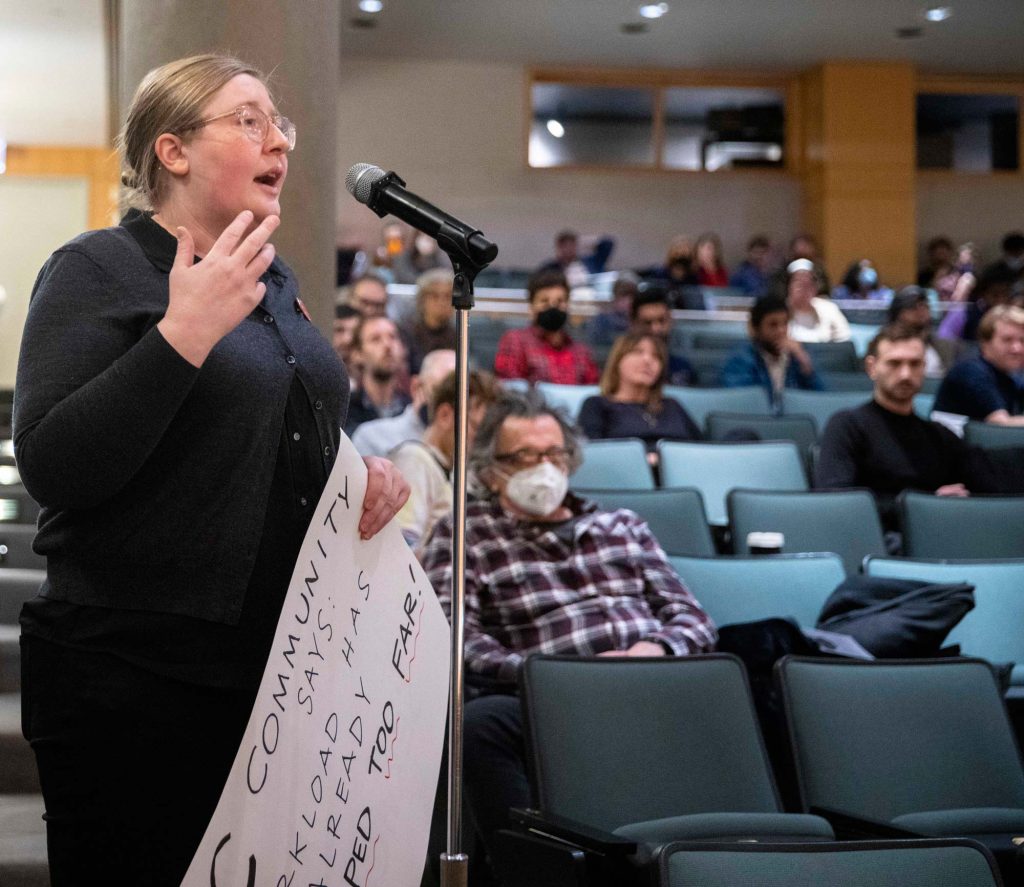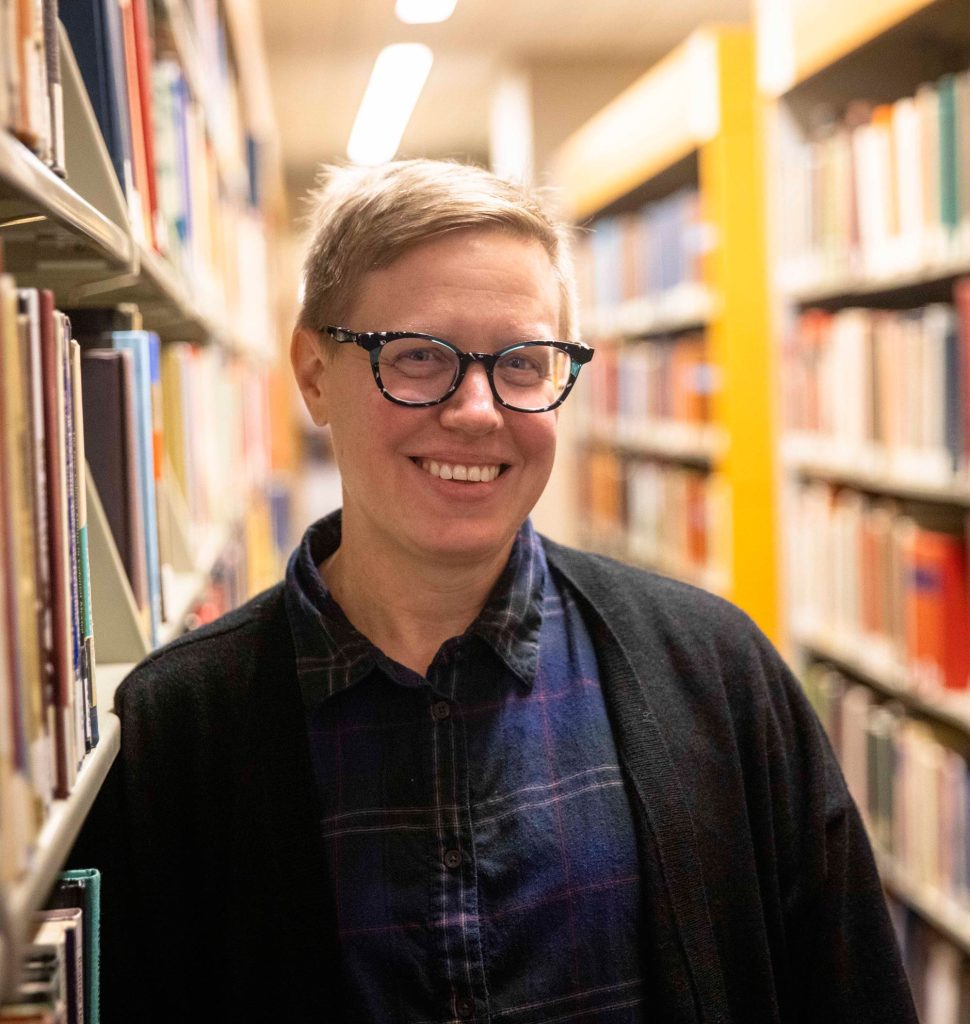
GC President Robin Garrell (left) and Provost Steve Everett address community concerns at a public meeting in December. (Credit: Dave Sanders)
More than 700 faculty, staff and graduate workers affiliated with the Graduate Center (GC) signed a letter of “no confidence” in President Robin Garrell, Provost Steve Everett and Senior Vice President for Finance and Administration Brian Peterson.
The lengthy sign-on letter circulating throughout the GC community accused top administrators of blocking hires that would have added diversity to the faculty, fumbling fundraising efforts, shirking their governance duties, creating a general climate of low morale and understaffing key offices resulting in increased workloads for current faculty and staff.
“Over the past two years, and especially over the last six months, the legacy of excellence has begun to fray, leaving the GC community bereft of leadership that is as good as the students, staff, faculty, consortial campuses and city it serves,” the letter stated.
FULL-TIMERS REVOLT
The letter was first drafted by full-time faculty members at the GC, however, the no-confidence call has since been endorsed by graduate workers, adjuncts and professional staff. The Graduate Center administration is relatively new: Garrell became president in August of 2020, and Everett joined a year later. But the signers believe substantial damage has been done.
“This letter is an expression of love as much as it is protest by full-time faculty and staff who have been at the Graduate Center for a very long time. Many of us are committed to the Graduate Center as an intellectual space of interdisciplinary and public facing and activist scholarship,” said Michelle Fine, a distinguished professor of psychology, urban education and women’s studies at the Graduate Center. “There were a number of events of concern that encouraged [us] to begin talking across departments and across positions. Some of those were labor issues, particularly the denied promotion of three women who were goddesses of the Graduate Center, who carried us through the COVID years.”
CHAPTER RESPONSE
The PSC GC Chapter said in a statement, “Many Graduate Center workers – including untenured staff, adjuncts and graduate assistants – feel that their most pressing needs have gone unmet and ignored. They have seen firsthand the consequences of mismanagement, with workers and students going unpaid and staff forced to cover employer expenses out of their own pockets. Senior management has also been uncooperative in labor-management meetings, showing a poor understanding of the PSC-CUNY contract and a pattern of obstruction.”
The chapter highlighted that the GC’s graduate workers are some of the lowest paid in the country, adding that “one-third of our doctoral students are tuition-only through a two-tiered funding system in which they receive no guaranteed health insurance, compensation or union membership; they must cobble together funding on a semester-by-semester basis through adjunct positions and contingent fellowships, while still expected to be full-time doctoral students and make timely progress towards their degree.”
To make matters worse, the chapter leadership said in its statement, the administration has responded to these concerns from union leadership with patronizing flippancy. “In one meeting with graduate assistants who raised concerns about unlivable wages, President Garrell suggested that they vote for better state political candidates and ask friends and family to make small monetary donations to the Graduate Center,” the chapter said. “This is an unacceptable response that attempts to absolve senior management of basic obligations to the workers of this institution.”
GC community members have complained about other problems, including things as basic as the lack of an on-site dining option at the GC, leaving students, faculty and staff to rely on a vending machine.
‘WORKLOAD CREEP’
Alycia Sellie, an associate professor in the library since 2013, told Clarion that two years of administrative downsizing has led to “workload creep.” In particular, she said, part of the business office migrated to CUNY Central, however, faculty and staff were then trained in invoicing and accounting as a result. “Now it’s everyone’s job to do procurement,” she said. “You take out this whole unit and spread out this work across everyone else.” She added that “support staff has decreased significantly.”

Alycia Sellie, an associate professor in the library, warns of ‘workload creep’ at the Graduate Center (Credit: Dave Sanders)
The administration also led a “push to reopen the library before we felt it was safe and before many of the myriad committees had approved a plan for reopening the library,” Sellie said, adding that the administration reopened the space without any library faculty, using public safety officers to monitor the space. “It was very jarring to be pushed aside and have the space seen as more important than the staff,” she said.
Gerry Martini, a PSC delegate for Higher Education Officers at the GC, agreed, saying, “When people leave, they aren’t always getting replaced. Their work is just shunted on to someone else, [and] almost always [to] someone who already has a full plate at work. In some cases, folks are told they have to take on tasks that they have not been trained for.”
For many PSC members at the GC, like Sellie, all of this has culminated in a “demoralizing” situation where there is a “lack of care, a lack of compassion” for the hard work members do every day.
Take, for example, the case of Emily Drabinski, a critical pedagogy librarian. Various right-wing outlets, including the New York Post, attacked her upon her appointment as president of the American Library Association, deriding her as an agent of radicalism and wokeness and belittling her self-identification as a “Marxist lesbian.”

Library faculty member Emily Drabinski feels the GC administration didn’t support her when the far right launched a campaign against her. (credit: Dave Sanders)
Drabinski said she did not receive adequate support from her bosses. “Following a round of right-wing media attacks on me personally, the provost responded by telling me to ‘stop tweeting,’” Drabinski said. “It was a chilling moment for me in what is supposed to be the best public university in the world.” She added, “It was not a great sign for how this administration will support academic freedom generally, or how it will react to red baiting more specifically.”
ADDRESSING CONCERNS
Garrell and Everett led a community meeting with 200 faculty members, staff and students on December 6. They addressed several of the concerns in the letter. Garrell admitted that there has been staff attrition, leaving remaining workers to take on more tasks. She said that budget constraints, a result of increased costs and dropping enrollment, have made it so that “We are not in a position to restore staff positions,” although she did say, “We’re looking to hire eight people.”
Everett, too, addressed the concerns raised in the letter, saying, “We’ve got to be more intentional on building a sense of community and communication.”
“COVID created a huge disconnect in this place, we’re trying to rebuild that,” Everett said. “You sharing your feelings is the first step of that.”
Garrell said, “Our heart is with the Graduate Center,” adding that she was committed to repairing the problems caused by pandemic. “I’m looking to you to help be that community that people loved and want back,” she said.
A CUNY spokesperson defended Garrell’s record, saying she is “responsible for securing a $9.5 million donation for the school’s Stone Center on Socio-Economic Inequality and funding for a new tuition-free master’s program aimed at diversifying astrophysics education,” adding that she worked “during challenging times,” and that “she takes seriously the concerns raised in the letter.”
OTHER CAMPUSES
This letter is not the first time PSC members have used statements of no confidence to address pressing issues on their campuses. In February of 2021, Clarion reported that the College of Staten Island Faculty Senate issued a statement of no confidence against President William Fritz and Provost Michael Parrish, due to what the faculty alleged was the “undermining of faculty governance and the mishandling of the campus budget.” Fritz announced his retirement later that year.
In the Fall of 2020, members at “Hunter College Campus Schools voted ‘no confidence’ in Hunter College President Jennifer Raab and in Hunter College Campus Schools Director Lisa Siegmann when the school attempted to start in-person classes without proper safety protocols in place,” Clarion reported. Unrelated to that 2020 no-confidence vote, Raab announced her intention to step down this past December.
In February 2020, Clarion reported that the Bronx Community College Faculty Council passed a vote of no confidence against Kay Ellis, vice president of administration and finance for “allowing gross physical deterioration throughout campus, including a lack of proper lighting and inadequate indoor heating under her watch.” Ellis announced her resignation this past December after new heating system troubles crippled the campus and faculty threatened a second no-confidence vote.
At the GC, the discontent is universally felt, and is boiling over in ways not recently seen at any CUNY campus.
“I served under seven GC administrations since 1980, and [I] worked as a senior administrator in several of them. I can say with certainty that there has never been, across the four decades of my career, anything close to this level of collective discontent and outright frustration with the leadership of the Graduate Center’s administration,” said Stephen Brier, a professor emeritus of urban education. “No institution of higher learning can survive and prosper in the face of such internal dissension; no senior administration can meet its important responsibilities to lead the institution without the cooperation and respect of its faculty, staff and students, which the current GC senior administration appears to have lost.”
GC LETTER EXCERPTS
Below are some excerpts from the statement of no confidence in the GC administration:
- “Diversity, Equity and Inclusion. On multiple occasions, the President has evidenced a lack of commitment to hiring faculty of color by blocking targeted hiring opportunities that would have diversified the GC’s faculty. In her lack of follow-through on recruiting efforts and complete unresponsiveness to requests for target of opportunity hires, the President has impeded efforts to attract faculty of color to the Graduate Center. The President and Provost have suppressed the work of DEI [Diversity, Equity and Inclusion] committees charged with creating recommendations for diversifying the GC, ignored committee and working group reports, refused to take action on specific action proposals, and neglected to even notify DEI advisors of in-process hiring efforts.”
- “Fundraising. Under the GC’s current leadership, the fundraising capacity of the GC has diminished due to the President’s inability to articulate a coherent vision and future for the Graduate Center, incompetent management of the Office of Institutional Advancement, damaged relationships with the Board of Trustees and lack of responsiveness to funders. And the fact that it is public knowledge that she is currently on the job market undermines any ability she might have to be persuasive with donors. The President’s actions on multiple fronts, from the abrupt firing of the GC’s VP for Institutional Advancement, to her lack of interest in meeting with donors, to her administration’s late responses to sign-offs for grant reports have directly resulted in a loss of revenue and reputation for the Graduate Center. Increasingly, funders are looking elsewhere for their philanthropic efforts and faculty are becoming reluctant to house grants at an institution that seems unable to manage awards with promptness, professionalism, and efficiency. In fact, grant-funded projects now have to explain to foundations that funds have gone unspent because of inefficiencies in the Graduate Center’s Business and Advancement offices.”
- “Governance. The President, Provost, and VP have consistently neglected governance activities, undermining the ability of GC faculty, students and staff to participate in the shared governance of the institution. Examples include committees that have…not been constituted or that have been constituted only after long delays, such as the Grad Council Budget Committee, the Auxiliary Board, and the Central Faculty Steering Committee, as well as committees, such as the Executive Council of [Executive Officers or EOs], which have had their meetings repeatedly canceled and rescheduled. There has been repeated bad faith execution of shared governance: organizational issues are routinely sidelined in cluster meetings, Council of EO meetings, and at Grad Council, while time is spent reporting on non-urgent and extraneous matters, even as the GC is in crisis. The result is a collapse in shared governance and a sense of deep frustration among students, faculty, staff and EOs who are forced to participate in meetings that don’t matter. The President and Senior Vice President have routinely expressed contempt and frustration publicly to faculty and students who speak at public meetings and have attempted on several occasions to take retaliatory action against whistleblowers. Their intolerant attitudes and aggressive tactics make some faculty, staff and students feel targeted. These actions have had a chilling effect on public deliberation; they have significantly undermined the trust of faculty and students in the administration, which is a foundation of shared governance.”
- “Gross mismanagement of staff. The GC leadership has consistently understaffed and undermined the work of Academic Affairs. The President held up the reclassifications of three highly qualified and valued members of the Provost’s staff for almost six months without credible explanation, despite those reclassifications having been approved by the GC’s PARC [Personnel Actions Review Committee] and HEO Screening Committees. After concerns were raised, the President, Provost, and Executive Director of HR dishonestly spoke, post-facto, of concerns that were not raised during the PARC and HEO screening committee meetings. The treatment of these employees by the President and the Provost was cruel, contemptuous and undermining of the academic mission of the GC. Finally, two were approved but the third was not for no credible reason. This has been part of a larger pattern in which the President, Provost, and Senior VP have routinely ignored communications from EOs, to the point where there is building-wide concern about how to reach them effectively on urgent matters. The senior leadership regularly ignores the advice of experienced staff and faculty, including facilities and security, sometimes expressing open disdain for those in the building whose academic and administrative expertise comes from within CUNY.”
- “Demands for Uncompensated Labor. GC leadership has shunted additional and uncompensated labor outside of job descriptions onto APOs [Academic Program Officers] and student employees by asking them to staff the front desk of the building when holding public events. Asking inexperienced staff to do the work of security officers has resulted in moments where program staff were harassed and berated by members of the public who wished to enter the building without COVID-19 vaccination cards. Staff have likewise been subject to unreasonable policies around daily trash removal, room reservations, event planning and other basic building operations necessary for programs to conduct routine activities and to plan public events. The lack of support for programs undermines the public mission of the GC by making it difficult to stage events.”
- “Business Office Dysfunction. The GC Business Office has rapidly degraded over the past six months. GC faculty, staff, and center directors have experienced extensive delays in payments, no support or significantly delayed help in creation of budgets, lack of communication on staffing changes, lack of responsiveness, and extended silence in response to email inquiries. Students and independent contractors have not been paid in a timely way – often months late. The GC’s reputation as a ‘late’ and ‘slow’ financial partner is spreading. There is no transparency or access to funding in the GC Foundation; the resources are all pooled and can’t be tracked back. Fund managers must keep shadow budgets and keep track of delayed Business Office responses that require repeated follow-up. The administration has cut staff from academic centers and has embarked upon a disruptive center review process with little communication, support or consultation. The GC has been very late and discourteous to foundations requesting grant reports. When these and other concerns were raised in a public letter to the President, Provost, and Senior VP for Finance and Administration, they were not taken seriously and were responded to only with a FAQ [frequently asked questions].”
- “GC-wide climate of discontent, disrespect and demoralization. Long-standing respected members of the GC community have been repeatedly treated with disrespect by the senior administration in both private and public settings. Morale in the building is at an all-time low. Communications are issued via fiat without consultation or community consultation. Management issues such as those described above have resulted in widespread demoralization among faculty, students and staff that has been exacerbated by a lack of community building. The lack of adequate food services aside from vending machines has furthered a sense of detachment, alienation and anomie.”
- “Lack of leadership and clear stated vision. The President’s commitment to the GC is unconvincing, given that neither she nor the Provost are able to voice a clear vision for the institution, despite repeated requests to do so. There has been a complete abdication on the part of senior administration to define immediate priorities or lead an efficient and legitimating strategic planning process; the President and Provost have been asked repeatedly to articulate a vision for the GC, but have ignored, sidestepped, or otherwise evaded their responsibility to define the parameters of strategic planning and to initiate a substantive conversation across the building about how extant GC goals and objectives might be changed in light of either CUNY’s specific conditions or new trends in higher education.”
Shomial Ahmad contributed additional reporting to this story.
Published: January 9, 2023 | Last Modified: January 23, 2023

